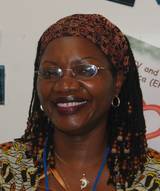Fulata L. Moyo is a systematic theologian; Church Historian; and gender and HIV and AIDS activist-academic. She received her doctorate from the School of Religion and Theology, University of KwaZulu-Natal, South Africa, in the area of Gender and ecological justice and Sexuality in the context of HIV and AIDS. Her interests lie in the area of women’s sexuality as embodied and interconnected spirituality: how this understanding of our interconnectedness impacts our life as a community of women, men (and ecology) who are committed to justice in gender, economy and ecology. Dr Mbano-Moyo is currently the WCC’s Programme Executive for Women in Church and Society with the mandate to coordinate women’s global work in all WCC’s member churches in all the 8 regions (North America, Latin America, the Caribbean, Europe, Asia, the Pacific, Middle East, Africa).
Before joining WCC, Dr. Moyo was a member of faculty at University of Malawi, Chancellor College in the Department of Theology and Religious Studies. She was also a teaching assistant of African Theology and Gender, Religion and the Church in Africa in the School of Religion and Theology at University of KwaZulu-Natal, South Africa. She is also trained and involved in the Tamar Campaign, which addresses violence against women and children using contextual Bible studies. This initiative was developed at Ujamaa Centre in the School of Religion and Theology at University of KwaZulu-Natal. Her publications in journals and book chapters have mainly addressed the religio-cultural influence on gender construction and women’s sexuality. She co-edited, Women Writing Africa: Eastern African Region. New York: Feminist Press. 2007. Dr. Mbano-Moyo is also the current General Coordinator of the Circle of Concerned African Women Theologians which, since its inception in 1989, has the mandate to undertake research, writing and publishing on African issues in Theology, religion and culture from women’s perspectives. The current Circle membership stands at more than 650 women of diverse backgrounds, nationalities, cultures, and religions rooted in African Indigenous Religions, Christianity, Islam and Judaism. She coordinates a team of seven regional and lingual coordinators: calling for executive meetings, fundraising for Circle activities, organizing the Pan-African conference at the end of the five-year term (2012), just to mention a few of her duties.

